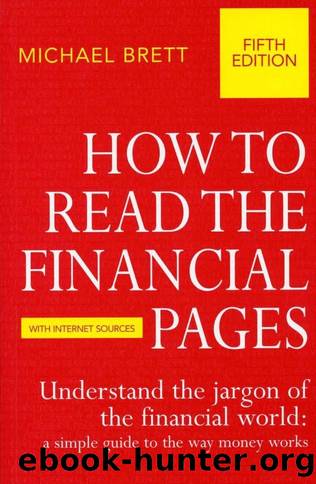How to Read the Financial Pages by Michael Brett

Author:Michael Brett [Brett, Michael]
Language: eng
Format: epub
Tags: Accounting, Business, Economics, Finance, Investments
ISBN: 9780712662598
Google: vB2yMt80p10C
Amazon: 0712662596
Publisher: Pimlico
Published: 2003-04-14T23:00:00+00:00
Objections to incentive schemes
The declared objective behind bonus schemes and the like is to ‘incentivize’ management so that it produces improved performance from which shareholders and the economy also benefit. This poses a second paradox. Why is it that the highest-paid people in a company need extra payments to persuade them to give of their best?
But there are more detailed objections to some of the incentive schemes in force today and these are raised sometimes in the press. Annual bonuses focus on short-term performance, may encourage short-term attitudes, and the basis on which they are granted may be far from clear. It is also fairly easy to manipulate earnings per share in the short term, and this is often the measure on which the bonus is based.
Executive share options are open to the objection that they may reward even poor management when the share price is carried up by a bull market – though the company itself has underperformed. They also dilute the interests of existing shareholders and provide little long-term incentive since the director almost always immediately sells the shares he receives from exercise of his options. Institutional shareholders have pressured managements to introduce a further performance criterion before options could be exercised, but these criteria are often undemanding. Options can only be exercised if the rise in company’s earnings per share has outpaced the rise in retail prices by a given percentage over a three-year period, and the like.
The longer-term share incentive plans (LTIPS) were introduced to counter some of the objections to share options though many companies operate the two in tandem. They do encourage a slightly longer-term view on the part of company management and sometimes introduce a more realistic performance criterion than share option schemes. But the criteria are again often relatively undemanding. Whether directors usually demonstrate confidence in their company by holding on to the free shares that they are given is questionable.
ESOPs are open to the objection that the company is exposing itself to a risk in the movement of its own share price. A second objection in the past was that they were often remarkably opaque – shareholders knew little if anything about them (but see below).
But the overriding criticism voiced of virtually all incentive schemes is that they offer directors a carrot, but no stick. Directors collect extra loot if the company or the share price does well. They do not suffer – as shareholders in the company suffer – if the company does badly. The frequent statements from companies that their schemes equate the interests of management and shareholders should therefore be viewed with a little cynicism. Incentive schemes may, it is sometimes argued in the press and elsewhere, encourage directors to take excessive risks with the company. If it works, they benefit. If it does not, shareholders suffer. And there is always the golden handshake at the end of the day as the ultimate reward for failure.
Download
This site does not store any files on its server. We only index and link to content provided by other sites. Please contact the content providers to delete copyright contents if any and email us, we'll remove relevant links or contents immediately.
Hit Refresh by Satya Nadella(8338)
The Compound Effect by Darren Hardy(7559)
Change Your Questions, Change Your Life by Marilee Adams(6641)
Nudge - Improving Decisions about Health, Wealth, and Happiness by Thaler Sunstein(6633)
The Black Swan by Nassim Nicholas Taleb(6190)
Daring Greatly by Brene Brown(5640)
Deep Work by Cal Newport(5463)
Principles: Life and Work by Ray Dalio(5322)
Rich Dad Poor Dad by Robert T. Kiyosaki(5149)
The Myth of the Strong Leader by Archie Brown(4789)
Man-made Catastrophes and Risk Information Concealment by Dmitry Chernov & Didier Sornette(4735)
Big Magic: Creative Living Beyond Fear by Elizabeth Gilbert(4723)
The Slight Edge by Jeff Olson(4722)
Discipline Equals Freedom by Jocko Willink(4635)
Digital Minimalism by Cal Newport;(4540)
The Motivation Myth by Jeff Haden(4524)
Stone's Rules by Roger Stone(4415)
Management Strategies for the Cloud Revolution: How Cloud Computing Is Transforming Business and Why You Can't Afford to Be Left Behind by Charles Babcock(4130)
The Doodle Revolution by Sunni Brown(4043)
